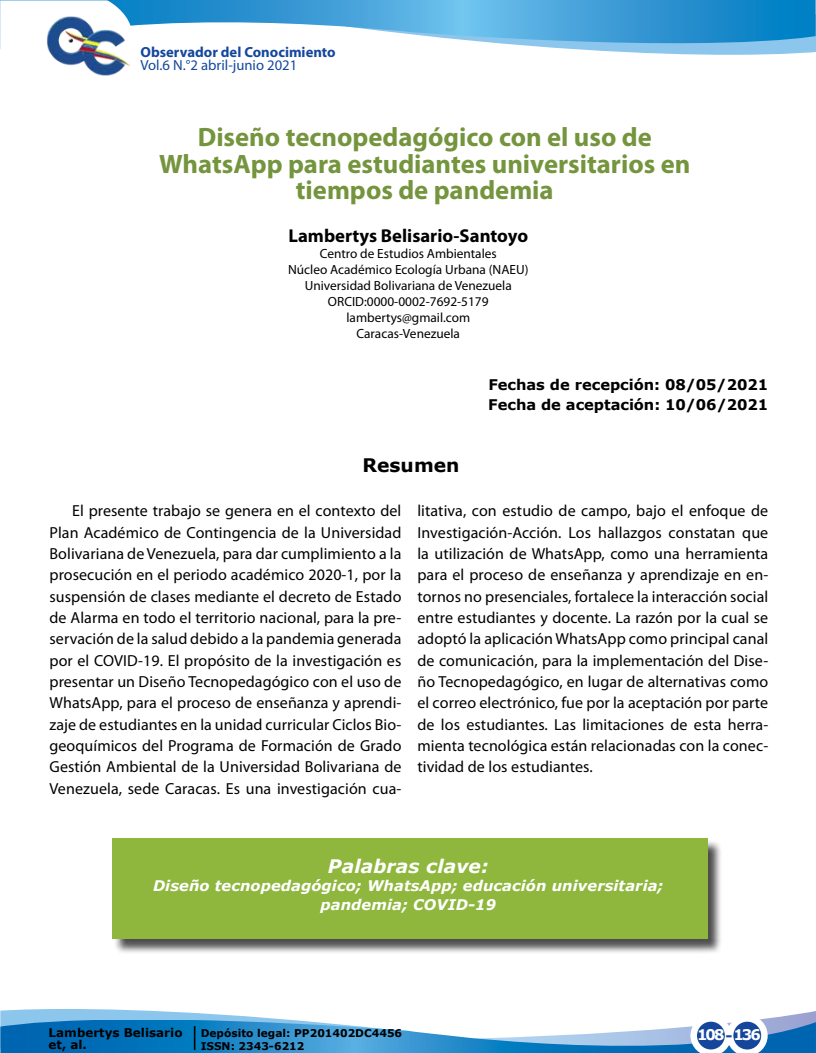Techno-pedagogical design with the use of WhatsApp for university students in times of pandemic
Keywords:
Technopedagogical design; whatsapp; university education; pandemicAbstract
The present investigation is generated in the context of the Contingency Academic Plan of the Bolivarian University of Venezuela, to comply with the continuation in the academic period 2020-1, due to the decree of State of Alarm throughout the National Territory, for the preservation of health due to the pandemic of COVID-19. The purpose of the research is to present a Technopedagogical Design with the use of WhatsApp, for the teaching and learning process of students in the curricular unit Biogeochemical Cycles, of the Degree Training Program Environmental Management of the Bolivarian University of Venezuela, Caracas headquarters. It is a qualitative research, with field survey, based on the Action Research approach. The results show that the use of WhatsApp, as a tool for the teaching and learning process, in non-face-to-face environments, strengthens the social interaction between students and teachers. The reason why WhatsApp was adopted as the main communication channel, for the implementation of the Technopedagogical design, instead of alternatives such as email, was because of the acceptance by the students. The limitations of this technological tool are related to the students' connectivity.
Downloads
References
Anteby, R.; Amiel, I.; Cordoba, M.; Axelsson, C.; Rosin, D.; Phitayakorn, R. (2021). Development and Utilization of a Medical Student Surgery Podcast During COVID-19. [Desarrollo y utilización de un podcast de cirugía para estudiantes de medicina durante COVID-19]. Journal of Surgical Research. 265, 95-99. https://doi.org/10.1016/j.jss.2021.03.059
Awada, G. (2016). Effect of WhatsApp on critique writing proficiency and perceptions toward learning. [Efecto de WhatsApp en el dominio de la escritura crítica y las percepciones hacia el aprendizaje]. Cogent Education, 3(1). http://dx.doi.org/10.1080/2331186x.2016.1264173
Bonilla, E. y Rodríguez, P. (2005). Más allá del dilema de los métodos: la investigación en ciencias sociales. Colombia: Norma.
Calvo, R., Arbiol, A., Iglesias, A. (2014). Are all chats suitable for learning purposes? A study of the required characteristics. [¿Son todos los chats adecuados para fines de aprendizaje? Un estudio de las características requeridas]. Procedia Computer Science, 27, 251-260.
Dan, B. y Mor D. (2014). WhatsApp Goes to School: Mobile Instant Messaging between Teachers and Students. [WhatsApp va a la escuela: La mensajería instantánea móvil entre profesores y estudiantes]. Journal of Information Technology Education: Research, 13, 217-231. Recuperado en: http://www.jite.org/documents/Vol13/JITEv13ResearchP217-231Bouhnik0601.pdf
Decreto Nº 4.160. Gaceta Oficial de la República Bolivariana de Venezuela, 6.519 (Extraordinaria), marzo 13, 2020.
Durrani M. (2020). Debate Style Lecturing to Engage and Enrich Resident Education Virtually. [Debates por conferencias para enriquecer la formación de los residentes de forma virtual]. Medical Education. 54(10), 955-956. Recuperado en: https://doi.org/ 10.1111/medu.14217
Elliott, J. (2005). La investigación-acción en educación. Ediciones Morata: Madrid-España.
Galeano, M. (2004). Diseño de proyectos en la investigación cualitativa. Medellín: Fondo Editorial Universidad.
Garrison, D.R., Anderson, T. y Archer, W. (2001). Critical Thinking and Computer Conferencing: A Model and Tool to Access Cognitive Presence. [Pensamiento crítico y conferencias por computadora: Un modelo y una herramienta para el acceso cognitivo]. American Journal of Distance Education. 15(1), 7-23. Recuperado en: http://dx.doi.org/10.1080/08923640109527071)
Gon, S. y Rawekar, A. (2017). Effectivity of E-Learning through WhatsApp as a Teaching Learning Tool. [Efectividad del e-learning a través de WhatsApp como herramienta de enseñanza y aprendizaje]. MVP Journal of Medical Sciences. 4 (1): 19–25. https://doi.org/10.18311/mvpjms.v4i1.8454
Guitert Catasús, M. y Romeu Fontanillas, T. (2019). Estrategias para la docencia en línea. FUOC. España. Recuperado en: http://materials.cv.uoc.edu/daisy/Materials/PID_00261609/pdf/PID_00261609.pdf
Martí Arias. J. y Martí Arias, A. (2009). Educación virtual: “TICs, e-Learning y Desarrollo. Ediciones Universidad Bolivariana de Venezuela. Caracas-Venezuela.
Means, B., y Neisler, J. (2021). Teaching and learning in the time of COVID: The student perspective. [Enseñar y aprender en la época de COVID: Perspectiva del estudiante] Online Learning. 25(1), 8-27. Recuperado en: https://doi.org/10.24059/olj.v25i1.2496
Ott, A., Broman, L., & Blum, K. (2018). A pedagogical approach to solar energy education. [Un enfoque pedagógico de la educación en energía solar]. Solar Energy. 173, 740–743. Recuperado en: http://dx.doi.org/10.1016/j.solener.2018.07.060
Orlandi, E. P. (2001). Discurso e Texto: forrnacáo e circulacáo dos sentidos. [Habla y texto: formación y comunicación de los sentidos]. Pontes, Brasil: Campinas,SP.
Resolución N° CU-V-09-01-2020. Universidad Bolivariana de Venezuela (2020). Acta N° CU-V-09-2020, Marzo 13, 2020.
Robinson, K. A., Ranellucci, J., Lee, Y., Wormington, S. V., Roseth, C. J., & Linnenbrink-Garcia, L. (2017). Affective profiles and academic success in a college science course. [Perfiles afectivos y éxito académico en un curso universitario de ciencias]. Contemporary Educational Psychology. 51, 209–221. Recuperado en: http://dx.doi.org/10.1016/j.cedpsych.2017.08.004
Sandín, M. (2003). Investigación cualitativa en educación: Fundamentos y tradiciones. España: Mcgraw Hill.
Schunk, D. (1997). Teorías del aprendizaje. Editorial. Pearson Educación.
Sideris, M., Hanrahan, J. G., y Papalois, V. (2020). COVID-19 and surgical education: Every cloud has a silver lining. [COVID-19 y educación quirúrgica: cada burbuja tiene un lado positivo]. Annals of Medicine and Surgery. 58, 20–21. Recuperado en: http://dx.doi.org/10.1016/j.amsu.2020.08.017
Universidad Bolivariana de Venezuela (UBV) (2006). Programa Unidad Curricular Ciclos Biogeoquímicos. Caracas: Autor.
Universidad Pedagógica Experimental Libertador (UPEL) (2014). Manual de Trabajo de Grado de Especialización y Maestría y Tesis Doctoral. (4th ed.). FEDUPEL, Caracas: Venezuela.
Zhang Qing, Yi-Jing He, Yu-Hang Zhu, Min-Chen Dai, Man-Man Pan, Jia-Qi Wu, Xian Zhang, Ying-Er Gu, Fang-Fang Wang, Xiang-Rong Xu, Fan Qu (2020). The evaluation of online course of Traditional Chinese Medicine for MBBS international students during the COVID-19 epidemic period. [La evaluación del curso en línea de Medicina Tradicional China para estudiantes internacionales de MBBS durante el período epidémico de COVID-19]. Integrative Medicine Research. Recuperado en: https: /doi.org/ 10.1016/j.imr.2020.100449

Downloads
Published
How to Cite
Issue
Section
License

This work is licensed under a Creative Commons Attribution-NoDerivatives 4.0 International License.







